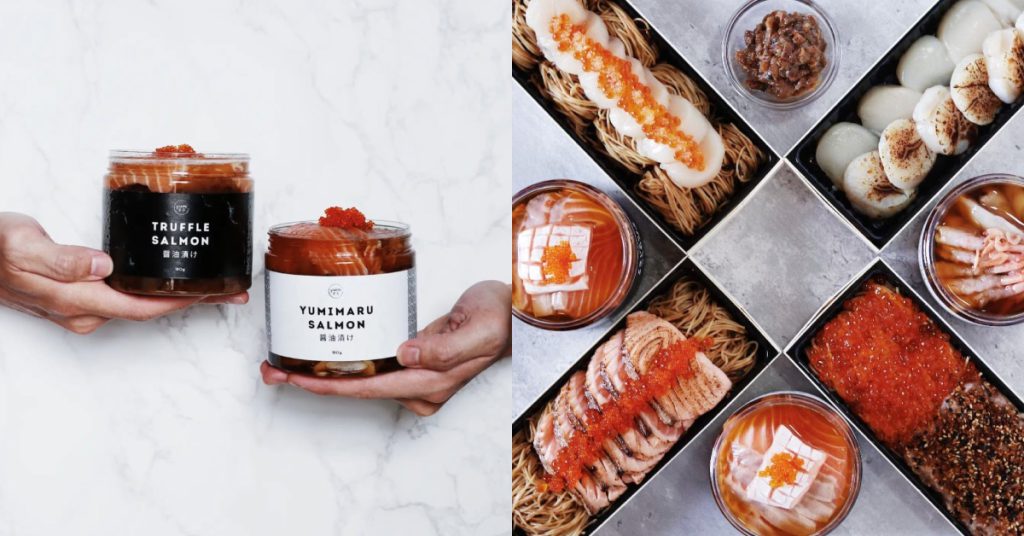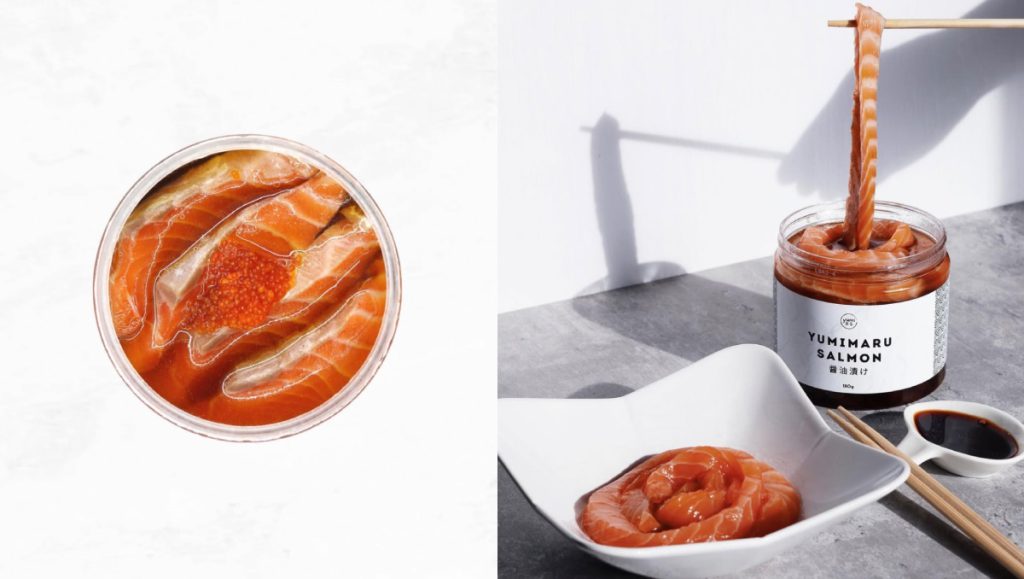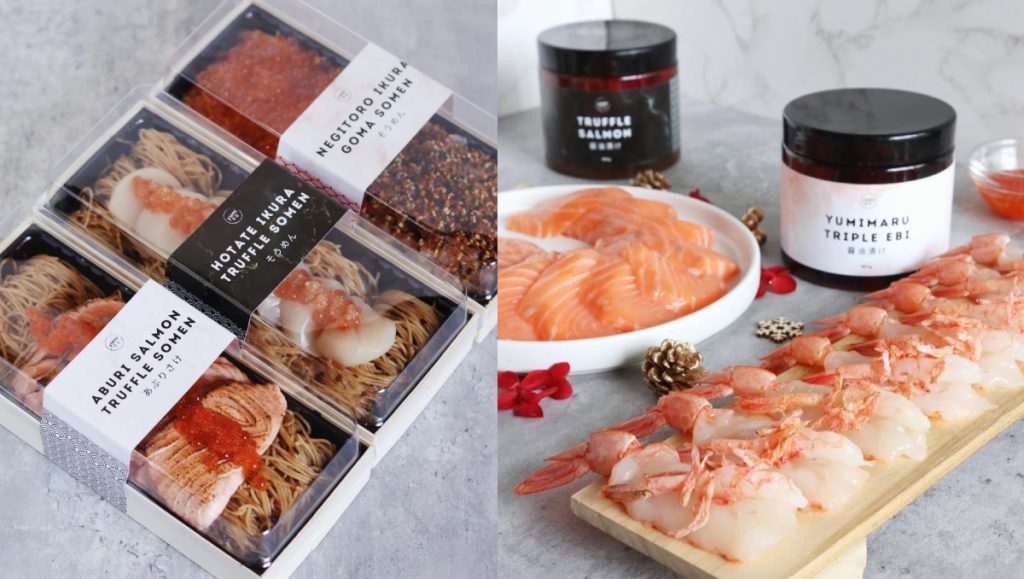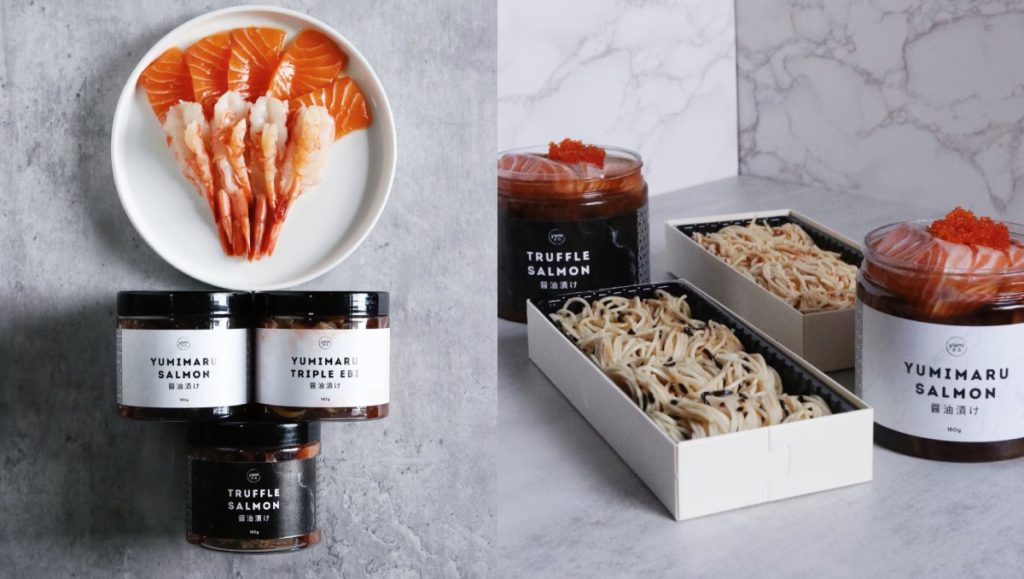Singapore’s food scene offers a wide variety of cuisines and innovative dining concepts; however, salmon dishes have traditionally been limited to a few standard preparations—grilled, pan-seared, or served plain as sashimi.
Seeking to offer a new way to enjoy salmon, James Looi co-founded Yumimaru together with his university friend in November 2022. The business’s speciality is shoyuzuke salmon, where sashimi-grade salmon is marinated in a homemade soy sauce blend.
It’s a Japanese preparation technique, and James likens the flavour profile of Yumimaru’s salmon to that of sukiyaki—a popular Japanese hotpot dish known for its rich, sweet-savoury broth—only lighter, with the clean, delicate taste of fish taking the lead.
In addition to salmon, Yumimaru also offers shoyuzuke ebi (prawns) and hotate (scallops), alongside somen—Japanese cold noodles—that serves as a refreshing accompaniment to the marinated seafood.
These products are sold on Shopee only once a week—and they generate an impressive average monthly revenue of between S$11,000 and S$13,000, with sales in June 2025 slightly exceeding the upper range.
We spoke to James on his entrepreneurial journey, here’s what the 28-year-old had to share about building his brand from the ground up.
A lean schedule

James and his co-founder both run Yumimaru as a side hustle, while holding full-time jobs. Though he did not disclose much details about his co-founder, James shared that he works as a Sales Development Representative at Airwallex, closing deals with clients.
Given their weekday commitments, the brand runs on a lean schedule, operating only on Saturdays.
Production typically begins at 8AM, with the team slicing fresh seafood and preparing their signature marinades. They wrap up by 1PM, just in time for same-day delivery—a key measure the duo maintains to preserve freshness and ensure quality in every order.
But getting to this point wasn’t easy. With no prior F&B experience, the duo spent about a month on research and development, going through nearly 30 iterations before perfecting their recipe.
Even after they started selling, the refinement didn’t stop. “We continued to tweak the recipe as time went on,” James said, adding that the duo listened closely to customer feedback—what they liked, what could be better—and adjusted accordingly.

Among Yumimaru’s offerings, the original Yumimaru Salmon—available either sliced or in a noodle-style cut—remains the top choice, accounting for 60% of the brand’s sales today.
The brand uses Norwegian salmon sourced from suppliers in Singapore, which James believes offers the freshest quality.
He also pointed out a common misconception among consumers: that the freshest salmon comes from Japan. In reality, salmon is not native to Japan, and although it is now a staple in Japanese cuisine, the fish was only introduced to the market in the 1980s, when Norway launched a targeted marketing campaign known as “Project Japan” to promote its surplus salmon to Japanese consumers.
Plenty of room for growth

Initially, Yumimaru sold their products through WhatsApp, leveraging the Take App platform which helps businesses manage orders and streamline communication with customers.
However, they’ve since migrated to Shopee to take advantage of features such as customer reviews, vouchers, easier refund processes, and a wider range of accepted payment methods.
Additionally, Shopee’s algorithm boosts visibility by recommending relevant products based on popular searches—such as “salmon”—often featuring Yumimaru among the top results.

So far, it seems like the shift has paid off. According to James, Yumimaru managed to break even within just four months, and the brand has generated a total of S$270,000 in revenue. It also has an average monthly customer retention rate of around 30%.
Still, James sees plenty of room for growth. He shared that his immediate goal is to double Yumimaru’s monthly revenue and sustain that level for six months to a year before considering further expansion—potentially into markets like Malaysia.
“Ultimately, we want to reach a point where we can step back from the business and not have to work every Saturday,” James said. “But hiring people and investing in machinery costs money—and we’re not the type to pour in capital without some certainty it’ll work out.”
- Find out more about Yumimaru here.
- Read other articles we’ve written on Singaporean businesses here.
Featured Image Credit: Yumimaru
